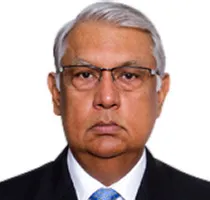
The mysterious disappearance of Jamal Khashoggi, a Saudi journalist living in exile in Istanbul, has let loose another round of name-calling and power play in the volatile West Asian region. With Syria, Libya and Yemen embroiled in civil war, the Khashoggi affair has come at an awkward time for the Kingdom of Saudi Arabia and its 38 years old, flamboyant and risk-taking virtual ruler, Crown Prince Muhammad bin Salman. Circumstantial evidence released by the Turkish media points the finger at an official Saudi role in the whole episode -- Khashoggi’s visit to the Saudi Consulate in Istanbul. He was seen in CCTV footage entering the Consulate but was not seen leaving the premises.
Khashoggi is a respected Saudi journalist. He was twice the editor of Al Watan, a relatively liberal Saudi newspaper. The Khashoggi family is of Turkish origin and Jamal is a nephew of the Saudi billionaire Adnan Khashoggi, once famous as an arms dealer. He was once close to the ruling family but was forced to resign. Fearing persecution, he fled into exile about a year ago. During the Afghan “Jihad”, he was involved with Osama bin Laden, at the behest of then Saudi Intelligence chief, Prince Turki bin Faisal.
Khashoggi, initially, was supportive of Crown Prince Muhammad’s reform programme -- like allowing women to drive. However, he turned critical of the Saudi regime when the Crown Prince ordered a massive crackdown on dissent, jailing thousands, including women. Even 300 members of the royal family and their business partners have been arrested for corruption. Khashoggi was particularly critical on the Yemen war. He called for talks and a stop to the wanton bloodshed there.
While the Turkish media, no doubt with encouragement from the Turkish government, has been publishing details of the incident, including gory speculation about Khashoggi’s murder in the Consulate by Saudi security personnel who flew into Istanbul in two private jets. The Turkish media has alleged that Khashoggi was murdered and his body or body parts spirited out in diplomatic vehicles and flown out in the private jets, which were waiting at the Istanbul airport. Even Ian Fleming, the famous author of the James Bond series, would have been impressed with the Saudi operation to eliminate a virulent critic of the Saudi regime. The Saudis have denied the Turkish media allegations and asserted that they do not know Khashoggi’s whereabouts and he left the Consulate the day he went in, to get Consular work done for his marriage. Turkey itself is no slouch in repressing journalists.
American media, quoting unnamed intelligence sources, say that the intercepts indicate that the Saudis were discussing plans to lure Khashoggi to Saudi Arabia and imprison him. Media speculation also hints at a kidnap plan that went awry. American media has also speculated that such a plan could not be implemented without a nod from the Crown Prince. Khashoggi was in regular contact with senior Saudi officials in the current regime who were trying to woo him and had promised support for a new think tank that he was planning to set up and lead. Clearly, the plan to engage Khashoggi fell through and he continued with his trenchant criticism of the Saudi regime in the American media, including the Washington Post, wherein he was writing a regular column. No one knows what really happened and those who know, i.e. the Saudis, are denying that they have anything to do with the disappearance of Khashoggi.
The pressure on the Saudi Crown Prince has built up considerably and he has sought to talk to senior American officials to deny any role in the incident. President Trump, whose son-in-law Jared Kushner is a close friend and business partner of the Crown Prince, is caught on the horns of a dilemma. Trump is under bipartisan pressure, from the Senate Foreign Relations Committee and the American media, demanding an investigation, which could lead to sanctions under the American legislation. Trump has also to navigate his own tendency to demonise the media and blame them constantly for “fake news”.
Meanwhile, Turkey is also ratcheting up the pressure on Saudi Arabia. Turkey wants a Joint Working Group with Saudi Arabia to investigate the incident in addition to its own investigation. Turkey’s President Recep Tayyip Erdogan has said that Turkey cannot remain silent on the issue. Turkish officials have confirmed that the 15-member Saudi official team which flew into Istanbul were present in the Consulate when Khashoggi visited the premises. While Saudi Arabia, in a public statement, has expressed its willingness to cooperate in the investigation, Turkish officials have let it be known that the Saudis are not cooperating.
The Americans and Turks are not averse to milking the crisis and there are allegations of Turkish complicity in the incident. Saudi Arabia and Turkey are not on the same page on the issues wracking West Asia. They have differed on Qatar and Syria. Turkey hosts the Islamic Brotherhood which has been banned in Saudi Arabia. It also opposes the US sanctions on Iran, whereas Saudi Arabia has pushed hard for the sanctions. Turkey has joined Russia and Iran in the Astana process for stabilising Syria and want American troops to leave. Saudi Arabia has encouraged the US not to abandon Syria. In this situation, Saudi-Turkey cooperation in Syria on humanitarian aid and support for a Turkish administered buffer zone in Syria bordering Turkey may become a casualty of the Khashoggi affair.
Turkish authorities probably know much more about what happened to Khashoggi than they have disclosed so far via the media. By releasing information in driblets, Turkey is keeping up the pressure and hopes to do deals with the Kingdom which promotes its interest in Syria and delivers economic gains. The Turkish economy has been under severe strain recently and the Turkish currency’s value has plummeted.
The nature of ties between Saudi Arabia and the US and between Saudi Arabia and Turkey is essentially transactional. Hence, whatever the outcome of the Khashoggi affair, there will be no fundamental rejigging of relations. However, Saudi Arabia is likely to run into heavy criticism in the American and international media. There is a pervasive mood that the media is under attack globally, even in democratic countries. Congressional quarters may make things difficult for the Trump administration to sell arms to the Kingdom. Saudi Arabia will do what it always does in such circumstances – throw more money at American lobbyists to mitigate criticism and buy off influential critics. In a worst-case scenario, an American embargo on arms sales, perhaps temporary, is a possibility, since there is zero probability, as of now, of Saudi Arabia cooperating in a transparent investigation.
Lastly, Crown Prince Muhammad will suffer reputational damage, if it is proven that Khashoggi was abducted or eliminated with his approval. Murmurings of dissent in the Royal family will grow louder and his position may come under threat. The Saudi regime’s staunch allies in the West, particularly the US and the UK, have benefited from Saudi largesse and multi-billion-dollar defence contracts. These countries, which use routinely megaphone diplomacy on human rights when dealing with many countries, treat the Saudi regime with kid gloves despite its abysmal human rights record. It is quite likely that the Saudis will get away lightly, after some back-room deals. The crucial question is whether this incident will lead to enough opposition within the Saudi regime and the Crown Prince is tossed out of power.
The views expressed above belong to the author(s). ORF research and analyses now available on Telegram! Click here to access our curated content — blogs, longforms and interviews.




 PREV
PREV


